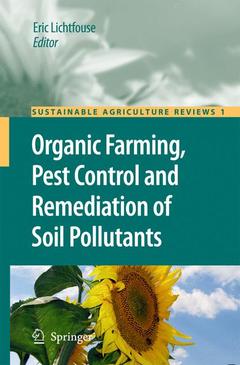Description
Organic Farming, Pest Control and Remediation of Soil Pollutants, 2010
Sustainable Agriculture Reviews Series, Vol. 1
Coordinator: Lichtfouse Eric
Language: English
Subjects for Organic Farming, Pest Control and Remediation of Soil...:
Keywords
Biodiversity; Cadmium; Ecology; Seed; climate change; environment; erosion; mineral nutrition; organic farming; soil; wheat
Publication date: 03-2012
418 p. · 15.5x23.5 cm · Paperback
Approximative price 210.99 €
Subject to availability at the publisher.
Add to cartPublication date: 11-2009
Support: Print on demand
Description
/li>Contents
/li>Biography
/li>Comment
/li>
Sustainable agriculture is a rapidly growing field aiming at producing food and energy in a sustainable way for humans and their children. Sustainable agriculture is a discipline that addresses current issues such as climate change, increasing food and fuel prices, poor-nation starvation, rich-nation obesity, water pollution, soil erosion, fertility loss, pest control, and biodiversity depletion. Novel, environmentally-friendly solutions are proposed based on integrated knowledge from sciences as diverse as agronomy, soil science, molecular biology, chemistry, toxicology, ecology, economy, and social sciences. Indeed, sustainable agriculture decipher mechanisms of processes that occur from the molecular level to the farming system to the global level at time scales ranging from seconds to centuries. For that, scientists use the system approach that involves studying components and interactions of a whole system to address scientific, economic and social issues. In that respect, sustainable agriculture is not a classical, narrow science. Instead of solving problems using the classical painkiller approach that treats only negative impacts, sustainable agriculture treats problem sources. Because most actual society issues are now intertwined, global, and fast-developing, sustainable agriculture will bring solutions to build a safer world. This book series gathers review articles that analyze current agricultural issues and knowledge, then propose alternative solutions. It will therefore help all scientists, decision-makers, professors, farmers and politicians who wish to build a safe agriculture, energy and food system for future generations.
Dr. ERIC LICHTFOUSE, born April 2, 1960, completed his Ph.D. in organic geochemistry in 1989 at Strasbourg University. After post-doctoral fellowships at Indiana University, USA and the KFA research center in Jülich, Germany, he became engaged as a soil scientist at the French National Institute for Agricultural Research (INRA) in 1992. His study on soil organic matter and pollutants led in particular to the first determination of the dynamics of soil organic molecules in long-term maize field experiments using 13C labeling at natural abundance. In 2000 he founded the European Association of Environmental Chemistry (ACE) and in 2003 the Journal Environmental Chemistry Letters. He has co-edited the book Environmental Chemistry (Springer, 2005). He is currently working in Dijon for the INRA Department of Environment and Agronomy as Editor-in-Chief of the journal Agronomy for Sustainable Development. He is growing fruit trees and vegetables in his home backyard and travelling from home to work by bicycle. Eric Lichtfouse is also finisher of 10 ironman competitions, including the World Ironman Championships in Hawaii in 2006.
First book on sustainable agriculture
Sustainable agriculture is the sole science to solve global society issues
Addesses issues from the molecular to the global level, using integrated knowledge from agronomy, biology, gelology, ecology, chemistry, environmental, social and economic sciences and political disciplines
Sustainable agriculture provides healthy food
Sustainable agriculture provides safe food and energy for all humans leaving a safe world for our children




